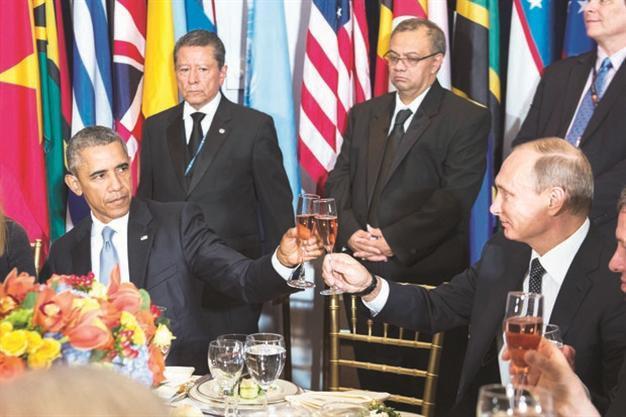US, Russia agree on Syria, split on Assad
WASHINGTON

AP photo
The United States and Russia have agreed on “some fundamental principles” for Syria, the U.S. Secretary of State John Kerry said Sept. 29, but the gap between the two world powers on the role of Bashar al-Assad in the future of the war-torn country remains vast after a key meeting between the two countries.The Kremlin has batted away demands by the West and regional players such as Turkey and Saudi Arabia for al-Assad to go immediately and insists members of the U.S.-led coalition need to join forces with him to defeat what they say is the greater evil of the Islamic State of Iraq and the Levant (ISIL).
Kerry said he plans to meet again with Russian Foreign Minister Sergei Lavrov on Sept. 30.
“There was agreement that Syria should be a unified country, united, that it needs to be secular, that ISIL needs to be taken on, and that there needs to be a managed transition,” Kerry told MSNBC in a television interview, adding that differences remained on what the outcome of such a transition would be.
Kerry also said he talked with Russia about pressuring al-Assad to halt the use of barrel bombs, possibly in exchange for something the U.S. might do, Reuters reported.
Russian President Vladimir Putin and his U.S. counterpart, Barack Obama, met Sept. 28 but failed to resolve their dispute over al-Assad.
In dueling speeches before the U.N. General Assembly, Obama branded the Syrian leader a “child-killing tyrant” while Putin said the world should support him against ISIL.
The Russian leader urged U.N. General Assembly members to unite to fight the jihadist group and warned that he planned to step up support for al-Assad’s forces and has not ruled out air strikes.
“We’re thinking about it,” Putin told reporters, though he added Russia would not send ground troops into Syria.
The U.S. and Russian presidents clinked glasses and shook hands at lunch with UN Secretary-General Ban Ki-moon after their addresses, but nothing could disguise the gulf in their positions.
Putin and Obama later met for 90 minutes for talks the Russian leader dubbed “constructive and business-like” and a senior U.S. official called a “business-like back and forth.”
Putin appeared pleased that Obama had agreed to Russia having a role in the debate, and said: “In my opinion there is a basis to work on shared problems together.”
Both leaders agreed there should be a process of political transition in Syria but, the U.S. official added, they “fundamentally disagreed” on the role of al-Assad.
“I think the Russians certainly understood the importance of there being a political resolution in Syria and there being a process that pursues a political resolution,” the official said.
“We have a difference about what the outcome of that process would be,” he added.
In his first speech to the world body in a decade, Putin warned it was an “enormous mistake to not cooperate with the Syrian group which is fighting the terrorists face-to-face.”
“We must address the problems that we are all facing and create a broad anti-terror coalition,” he said, proposing a Security Council resolution on a coalition to include al-Assad and Iran.
“The United States is prepared to work with any nation, including Russia and Iran, to resolve the conflict,” Obama said.
He argued al-Assad drives Syrians into the arms of such groups by such acts as dropping “barrel bombs to massacre innocent children.”
Not to be outdone, the Russian leader blamed the rise of violent extremism on the U.S. military interventions in Iraq and Libya, which he said unleashed chaos in the Middle East.
French President François Hollande stuck close to Obama’s line.
“Russia and Iran say they want to be part of a solution,” he said. “So we must work with these countries to explain to them that the route to a solution does not go through Bashar al-Assad.”
In his speech, Obama did not specifically address al-Assad’s fate in efforts to re-launch a bid to end a war that has left more than 240,000 dead since 2011.
But he declared that there could be no return to the pre-war status quo, when al-Assad held sway.
Putin scorned this stance, arguing that only the Syrian people could depose their leader and that al-Assad had agreed to begin a reform program to bring more people on board.
“I relate to my colleagues the American and French presidents with great respect, but they aren’t citizens of Syria and so should not be involved in choosing the leadership,” he said.
Putin and Obama discussed information sharing on the crisis in Syria when they met in New York on Sept. 28, Kremlin spokesman Dmitry Peskov said.
Peskov said an information center was being established in Baghdad to share information between Russia, Iran, Iraq and Syria. Russia has also agreed to a separate such mechanism with Israel.
“It is no secret that American specialists and American military have been invited to work in the Baghdad center,” Peskov told journalists on a conference call. “Unfortunately, they have not participated in the first meetings and discussions.”
Separately on Sept. 29, Russian state news agency RIA quoted an unnamed source as saying the center was expected to begin operations in October or November.
















